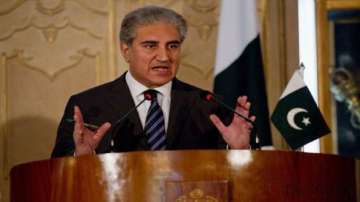India's narrative that reorganisation of Jammu and Kashmir was required to bring about socio-economic development in the region has not been accepted by the international community and people in the Valley, Pakistan Foreign Minister Shah Mohammed Qureshi said on Friday.
The foreign minister said people in Kashmir were questioning the changing status of the Valley as they feel it was done to effect demographic changes in the region.
On August 5, India revoked the special status given to Jammu and Kashmir and bifurcated it into two union territories- Jammu and Kashmir, and Ladakh.
Pakistan downgraded diplomatic ties with India and expelled the Indian High Commissioner after New Delhi abrogated provisions of Article 370.
Pakistan has been trying to internationalise the Kashmir issue but India has asserted that the abrogation of Article 370 was its "internal matter".
India has always maintained that Jammu and Kashmir is its integral part and ruled out any third party mediation, including either from the UN or the US, saying it is a bilateral issue with Pakistan.
Qureshi was interacting with a group of Indian journalists ahead of the inauguration of the Kartarpur corridor.
Asked why India's decision on Kashmir should be considered differently from Pakistan effecting constitutional changes in the administrative structure of Gilgit Baltistan, Qureshi said the main issue has been how India adopted a unilateral approach, ignoring aspirations of Kashmiris.
He said after India's decision to withdraw Jammu and Kashmir's special status, relations between the two countries have come to a level which to every sane mind was "scary".
"Two nuclear armed countries came face to face. There have been continuous violation of ceasefire along the Line of Control,” he said.
“What people of Kashmir are questioning is the change in status of Kashmir. What people of Kashmir are questioning is the fact that there could be a demographic change, a design to demographic change,” he said.
Latest World News

